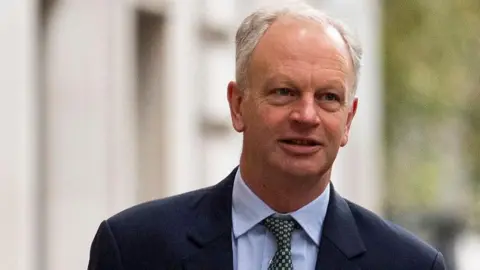 PA Media
PA MediaAll eyes were on outgoing Post Office chief executive Nick Read this week as he spent three days in front of the inquiry into the Horizon IT scandal.
Mr Read replaced former boss Paula Vennels in 2019 and was brought in to “right the wrongs of the past”.
Wrongful prosecutions may have stopped, but he still had questions to answer about how much the organisation has really changed when he gave evidence.
Mr Read had taken leave of absence from his day job to prepare for the inquiry.
Unlike the appearance of his predecessor, Paula Vennells, there were no tears. But there were some key revelations.
Here are five things we learned from his evidence.
Told not to ‘dig into’ the past
It has become clear that, either by accident or design, Mr Read was not made aware of the scale of the challenge facing him at the Post Office.
Between 1999 and 2015, hundreds of sub-postmasters were wrongly prosecuted when faulty Horizon accounting software made it look as though money was missing from branches.
When Mr Read took the top job in September 2019, the organisation had just lost one High Court judgement to a group of those wrongfully prosecuted sub-postmasters and was about to lose another.
However, there was no reference to the ongoing legal challenges in his job description. The flawed IT system Horizon was not mentioned once.
In fact, the Post Office’s top lawyer reportedly told Mr Read not to “dig into” what had happened in the past.
He was even told there was no “huge PR risk”. He said the organisation was partly in denial, partly in paralysis.
Regarding the people who came before him, Mr Read told the inquiry that many of the Post Office’s former leaders “appear not to have been held to account”.
Frustrated about his own pay
Mr Read’s leadership has been dogged by controversy about his own remuneration. His former HR director claimed he was “obsessed” with getting a pay rise.
He admitted he had been “frustrated at times”, had repeatedly lobbied for more money, and even took legal and PR advice from friends.
Mr Read said it never became a distraction, but did apologise for how “poor” it looked given so many victims are still waiting for compensation.
Claims about bullying, misogyny, and pay had come from people who had left under a cloud, he said.
He even alleged, in his written witness statement, that one of those people, former chair Henry Staunton, had fallen asleep in board meetings.
Government using Post Office as a ‘shield’
New figures released this week show that £363m has already been paid out to former sub-postmasters in financial redress, but many are still waiting.
Before Mr Read began giving his evidence, the inquiry chair emotionally revealed that another victim passed away last week without ever receiving the money she was owed.
The Post Office boss said it was of “deep regret” to him that the process was taking so long. He blamed bureaucracy, not prejudice or penny pinching.
He said it was “astonishing” that it was his organisation managing some of the schemes, given the lack of trust people have in the Post Office.
Could the government be using the Post Office as a “shield” to remove itself from compensation decisions? “That could be a description, yes,” he admitted.
 Getty Images
Getty ImagesStaff implicated by the scandal still working
For many sub-postmasters, the continued employment of people who investigated them or were at the Post Office at the height of the scandal is a bone of contention.
Mr Read revealed three employees are still being investigated as part of Project Phoenix. That means they’ve been accused of wrongdoing.
He also admitted a “handful” of investigators were still with the organisation – albeit in different roles now.
The chief executive wanted to assure the inquiry he would not ignore specific allegations and would ask people to step back from roles if it helped with sub-postmaster confidence.
However, when he was shown meeting notes suggesting ministers were happy for the Post Office to be more robust and not worry about employment tribunals, Mr Read was forced to admit they had struggled to “move people on” from the organisation.
Contract for sub-postmasters is ‘heavy-handed’
“Where has the money gone?” It is one of the many, as yet, unanswered questions in this scandal.
Mr Read was repeatedly questioned about the whereabouts of the cash put up by sub-postmasters to cover apparent shortfalls in their branch accounts. The boss put a new figure on the missing money: £36m.
Mr Read said he was annoyed it was proving difficult to work out.
He expressed surprise at survey results suggesting sub-postmasters are still facing problems and using their own savings to make losses good.
Meanwhile, inquiry lawyers pointed to new sub-postmaster contracts which still refer to the Post Office’s investigatory powers, including evidential interview processes under caution. Mr Read admitted this might be “heavy-handed”.
Mr Read’s evidence might now be complete, but he has several months left in the role. He assured the inquiry he would spend the time working to bring about more change. Sub-postmasters will be watching closely.
